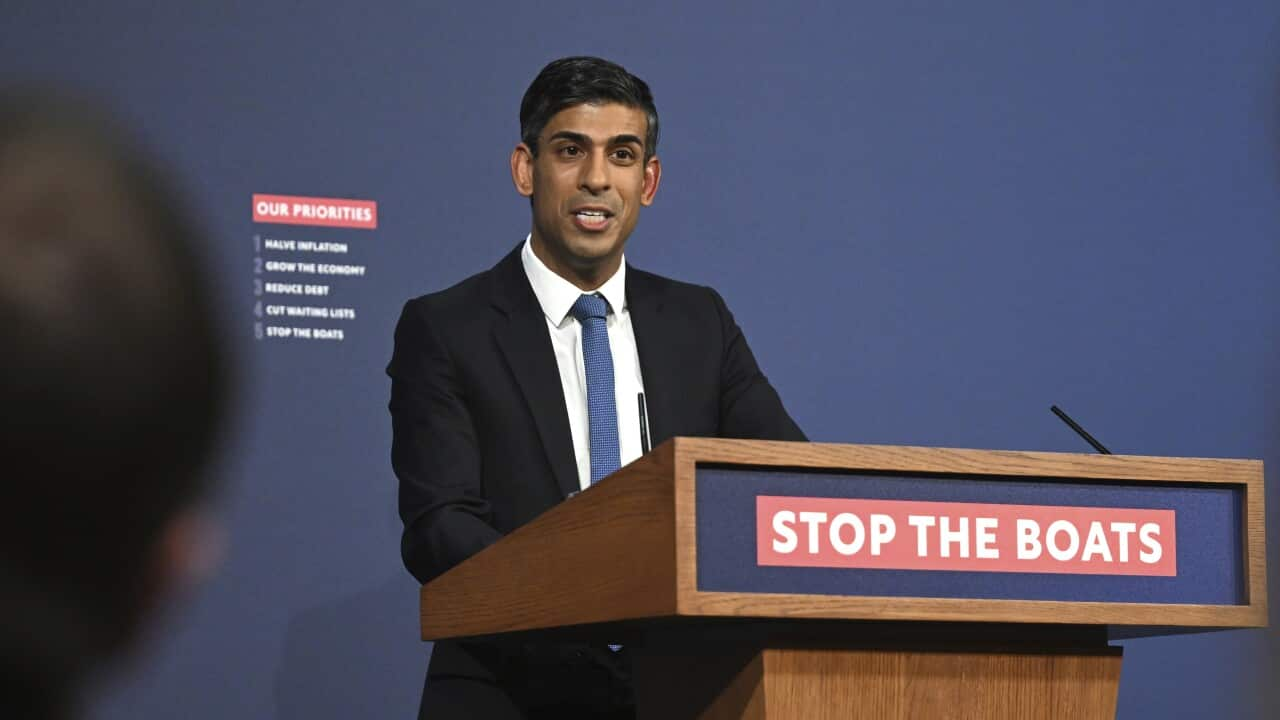Key Points
- In 2022, Rishi Sunak promised to ‘stop the boats’; to end the trafficking of migrants across the English Channel.
- His policy involved deporting migrants arriving by boat to Rwanda, and banning them from ever entering the UK again.
- Experts say the unpopular policy may contribute to a loss in the UK election this week.
Shortly after Rishi Sunak became Prime Minister of the United Kingdom in October 2022, he made a series of pledges.
One promise was to ‘stop the boats’, which meant ending the trafficking of migrants across the English Channel.
It was a bold pledge inspired by former Australian prime minister Tony Abbott’s 2013 Operation Sovereign Borders policy, which sent people arriving in Australia by boat to offshore detention centres.
The UK government appointed Australia’s John Howard-era foreign minister John Downer to an advisory panel for its new migration strategy.
At the heart of the UK policy was a similar deterrent — a plan to deport migrants arriving by boat to Rwanda in East Africa, where their asylum claims could be processed. They would be banned from ever entering the UK again.
‘Out of touch’
In 2022 a record 45,755 people were detected arriving by small boats onto UK shores. That figure dropped slightly in 2023, the year Sunak made his promise. But by early 2024 it was increasing again, up 43 per cent compared to the same time the previous year.
To date, not a single migrant has been forcibly removed from the UK and sent to Rwanda.
Matthew Flinders, a politics professor at Sheffield University, said he believes many people did not think the policy would work.
“The whole idea of the United Kingdom sending somebody to Rwanda, claiming it was a safe place, just didn’t wash,” he said.
“It would have been cheaper to give everybody a million pounds in cash to send them home. And the fact that Rishi Sunak stuck with the policy, I think, became part of a general narrative that he was out of touch.”
This Thursday 4 July Brits will head to the polls in the general election (though voting is optional), with Sunak’s Conservative Party widely expected to be defeated by Keir Starmer’s Labour Party.
If the Conservatives lose, there will be much speculation over what went wrong for the party, which in 2019 under Boris Johnson won a powerful 80-seat majority in the House of Commons and was expected to govern for another generation.
Political sociologist professor Paula Surridge has studied voter behaviour for over 30 years and says Sunak’s failure to deliver on his migration promises will intensify the Conservatives’ loss.
“It affects a very specific group of voters, which are those that are moving from Conservative to Reform, for whom immigration is their top issue, and they see the government as having failed to deliver on it.”
What is the Reform UK party?
Experts say Reform UK has reaped the rewards of Sunak’s failings.
The far-right party headed by Brexit campaigner and Donald Trump ally Nigel Farage says it offers “common sense policies on immigration”. Its website homepage says Thursday’s vote is “the immigration election”.
“They’ve surfed in on the back of a belief that the government has no control at all over immigration,” Flinders said.
“Also the fact that [the Rwanda policy] has consistently been blocked by the courts, has given Reform a perfect platform to say the government’s not in control.”
Surridge believes Reform voters have no faith in the prime minister’s Rwanda plan.
“Even had we seen planes take off, Reform voters don’t think it would have stopped the boats. It’s not that they’re against it on ideological grounds, they just don’t think it would ever have worked.”
Reform polled higher than the governing Conservatives in June, though due to Britain’s winner-takes-all voting system, it is likely to send only a few MPs to Westminster.
A future prime minister?
Reform is hoping to sweep up the right-wing vote and win enough seats to become a noisy opposition to the expected Labour government.
And its leader Nigel Farage is set to enter Westminster for the first time.
“Farage believes that in five years, he could be prime minister. Now at the moment, that sounds absolutely ridiculous,” Flinders said.
“But the way British politics is going and the way politics and other countries are going at the moment, you wouldn’t count that out.”
